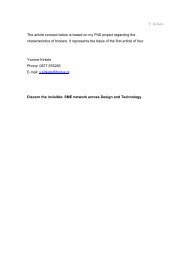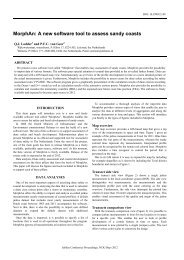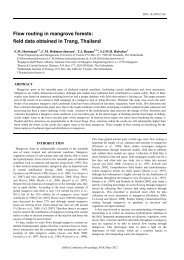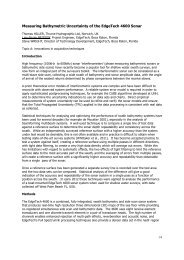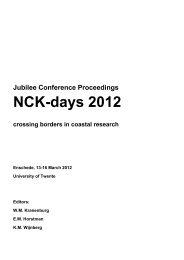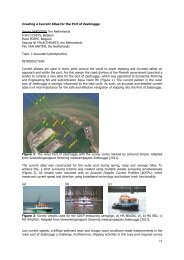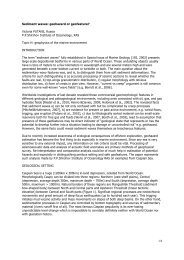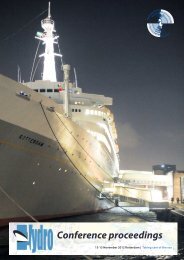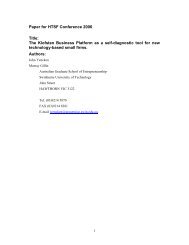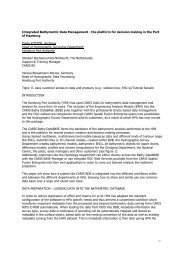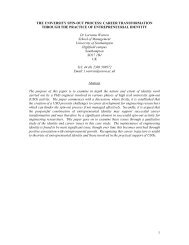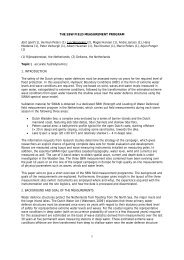INTRODUCTION - UT Proceedings
INTRODUCTION - UT Proceedings
INTRODUCTION - UT Proceedings
You also want an ePaper? Increase the reach of your titles
YUMPU automatically turns print PDFs into web optimized ePapers that Google loves.
Marc DAUWE, Belgium <br />
Antwerp Maritime Academy <br />
Micha LIBERT, Belgium <br />
Antwerp Maritime Academy <br />
Axel ANNAERT, Belgium <br />
Antwerp Maritime Academy <br />
Topic L: the hydrographic profession <br />
Hydrographic Training in Belgium <br />
<strong>INTRODUCTION</strong> <br />
Nautical charts for mariners, tidal predictions and information on changes in navigational <br />
areas are indispensable to the global merchant marine, and offshore, dredging and <br />
underwater projects. Collecting data on the world’s oceans and seas is the responsibility of <br />
hydrographers. Their expertise is essential to modern society and economic systems, <br />
underlining the importance of quality education in this field. <br />
Recent survey studies in the Netherlands 1 and Belgium 2 however, have pointed to a <br />
weakness in hydrographic training in both countries, with a shortage of both suitable <br />
programmes and institutions offering such training. In Belgium, most hydrographers are <br />
engineers who are trained within a company. This implies a potentially unnecessarily long <br />
period of training before they are fully employable as hydrographers. 3<br />
A market study on hydrographic surveyors in Belgium revealed that over 300 hydrographic <br />
surveyors are active in Belgium, of whom a large portion are not certified. Moreover, the <br />
industry would need another 35 new hydrographic surveyors annually. With this in mind, the <br />
present system of companies using in-‐house training of existing engineers risks inefficiency, <br />
as well as missing the benefits of a healthy academy in support of the industry. <br />
Investigations on a global scale underline the shortage in hydrographic surveyors even <br />
further. 4<br />
Only few institutes in Europe offer programmes in hydrography, especially in English or the <br />
advanced category. In such a globalised set of industries as professional hydrographic <br />
expertise is required in, the lack of adequate training in English at the highest level <br />
represents a serious weakness. The Antwerp Maritime Academy (HZS) responded to the <br />
growing need with postgraduate programmes in hydrography. The institute established the <br />
postgraduate programmes Cat. B and Cat. A. <br />
1 Annelies Claeys, “Rapport hydrografieonderzoek” (Ma diss., Ghent University, 2009). <br />
2 Rodrigue Bijlsma, “Hydrografie” (Ba diss., Antwerp Maritime Academy, 2011); Rodrigue Bijlsma, “Hydrografie. <br />
Het in kaart brengen van de Belgische hydrografische sector, de Europese IHO gecertificeerde opleidingen en <br />
Het Institute For Hydrography” (Ma diss., Antwerp Maritime Academy, 2012). <br />
3 Bijlsma, “Hydrografie. Het in kaart brengen van …”, p. 83.<br />
4 Ibid.
METHODS <br />
History and the establishment of a programme <br />
Some situations underlined the need for a proper programme in hydrography. The <br />
continuous interest in the introductory course in hydrography at the HZS, and the results of <br />
the market research, indicating a deficiency in top level professional qualification and <br />
certification, revealed a niche for setting up the first full programme of hydrography in <br />
Belgium. <br />
The HZS organised a round table discussion concerning the absence of proper education for <br />
professional hydrographers. Several higher education institutes, Flanders Hydrographic <br />
Services, Flanders Hydraulics and the industry attended the discussion in March 2010. The <br />
conclusion of the meeting was clear: there is a need for hydrographic training in Belgium and <br />
the new programme should put a strong emphasis on international recognition and <br />
accessibility. <br />
During several meetings over the course of two years, continuous deliberation led to the <br />
definition of the programmes. The entry requirements and duration of the courses were also <br />
discussed and finalised, allowing lecturers to be identified and commissioned. Throughout <br />
proceedings, the flexibility of the course was held as the key criteria for the success of this <br />
new training programme. <br />
As a result of careful management the postgraduate programmes were established by the <br />
HZS in close collaboration with Ghent University (UGent), Flanders Hydraulics, and partners <br />
from the maritime industry. The official launch of the ‘Institute for Hydrography’ within the <br />
HZS took place in March 2012. <br />
Programme <br />
The postgraduate programmes in hydrography were established in full accordance with the <br />
IHO Standards of Competence S-‐5: a category B programme for hydrographic surveyors and <br />
a category A programme for chief hydrographic surveyors. Both programmes consist of a <br />
two year training course, during which the HZS provides a solid theoretical framework <br />
complemented by practical and hands-‐on experience.
The timetables of the two, 2 year postgraduate programmes in hydrography run along <br />
similar lines. The first semester consists of 14 weeks of theory courses followed by <br />
examinations in January. This theory is then put into practice during a semester of practical <br />
projects, workshops, seminars and visits during which the students are rotated between <br />
different organizations, both industry practitioners and training establishments. <br />
This approach provides the students with the opportunity to put their theoretical framework <br />
to good use in a practical environment. After successfully finishing this year of the <br />
programme, students are awarded a declaration. <br />
The second year focuses on fieldwork at a company or institute, from amongst the partner <br />
organizations, to further develop the student’s practical skills. During this year students <br />
experience real work as a hydrographer and prepare themselves thoroughly for their future <br />
careers. <br />
After completion the student receives a category B or category A certificate depending on <br />
the programme they have been following. <br />
Quality and certification <br />
The Antwerp Maritime Academy is certified ISO 9001:2008 5 . All activities of the Institute for <br />
Hydrography are incorporated into the Maritime Academy’s quality system. As such, the <br />
school vouches for the high quality and excellence of its students, including hydrography <br />
postgraduates. <br />
5 ISO 9001 are a set of standardized requirements for a system of quality control employed by a firm or <br />
institution. More info on www.iso.org.
A crucial element that grants accreditation and lends validity to a programme and <br />
certification such as this one is its acknowledgement by an institution of note, respected in <br />
the field. The HZS is in the process of acquiring acknowledgement by the International <br />
Hydrographic Organization (IHO) in Monaco, the authority in the field of hydrographic <br />
survey. This vital recognition will allow the programme to fully develop its reputation <br />
through excellent training, and to be at the forefront of development in the industry. <br />
To continuously monitor the quality of the programme, an interactive correspondence with <br />
students and industry has been made an integral part of the programme. This results in a <br />
constant upgrading of the course and practical training, keeping all aspects of the <br />
programme fully up to date and on the leading edge of industry methods and thinking. For <br />
this purpose a steering council has been established within the Institute to ensure quality <br />
and innovation. The steering council is responsible for decision-‐making, oversight, <br />
monitoring and follow-‐up of the programmes. <br />
Furthermore all courses are delivered by lecturers expert in their fields. The cooperation <br />
between the different partners allows specific knowledge and skills to be taught by those <br />
individuals best qualified to do so; leaders in their fields. The collaboration between the HZS <br />
and UGent results in an immediate concentration of collective knowledge and experience, <br />
which enables it to become one of the leading institutes of hydrography globally. <br />
Compatibility and Flexibility <br />
Candidates for the postgraduate programme cat. B are required to present a Bachelor’s <br />
degree. There is no field of study specified so any Bachelor can be admitted. Candidates <br />
have to prove their knowledge of Mathematics and Physics, as well as sufficient English <br />
proficiency. The knowledge of basic sciences is essential as science is the basis of most <br />
courses and this minimum of scientific accomplishment should be established at the <br />
beginning of the course. <br />
Participants with relevant competences may be eligible for exemptions for certain modules. <br />
Based on documentary proof, the extensive application portfolio and personal interviews, a <br />
selection committee decides on exemptions for each candidate on an individual basis. <br />
The programme structure allows the students great flexibility. Because of the modular <br />
system, the theoretical courses take place during the first semester of the first programme <br />
year. The second, third and fourth semester consists of fieldwork, during which the students <br />
engage in a specialized placement in the industry as trainees. <br />
STCW educational decrees enable already active hydrographers to take up a flexible and <br />
individual curriculum. The candidate can choose to extend the programme courses over a <br />
period of maximum five years, thus allowing part-‐time work at one’s own pace. This serves <br />
to ensure as seamless as possible an integration between existing in-‐house training <br />
arrangements and a more institution based approach. <br />
HYDROGRAPHY AT HZS <br />
The HZS as an educational institution focuses on the future with a scientific and innovative <br />
approach. Its aim is to provide outstanding programmes that answer to both the institute’s
standards and the international IHO standards of competence. Establishing a course in <br />
hydrography and meeting the demands of both the industry as well as the professional-‐to-be,<br />
was therefore a logical step. In addition to freeing up industry training resources and <br />
streamlining the process of becoming a hydrography professional, the benefits of <br />
centralised, concentrated yet easily accessible expertise are not to be underestimated. <br />
Only a few institutes in Europe offer English language programmes in hydrography. With <br />
English as the course language, we are able to accommodate students from all over the <br />
world. With this, the Antwerp Maritime Academy underlines another element of its mission: <br />
international purveyance of education. <br />
Continuous quality control and upholding high standards is a priority. The HZS pays extra <br />
attention to partnerships to safeguard the excellence of its training programmes. With a <br />
team of experts from academic and industry backgrounds, supported by specialized <br />
equipment, students receive a solid theoretical framework. The negotiated training <br />
opportunities enable students to practice their learnt skills in a professional environment, <br />
ensuring graduates are in the best possible position to thrive as hydrographers from the <br />
start of their careers. <br />
Students can create an individual curriculum and study relevant subjects at a time most <br />
convenient and sensible for them in relation to their individual studies. Students may be <br />
eligible for exemptions from particular modules when they have previous knowledge or <br />
experience in a field. To ensure an open, international approach and increase accessibility, <br />
all courses are taught in English. This flexibility puts the programmes in an exceptional <br />
position to cater for students and active hydrographers alike. <br />
PROSPECTS <br />
The delivery of certified and capable hydrographers is the principle aim of these educational <br />
programmes. For a field that is in constant need of qualified people, in a country lacking any <br />
hydrographic training, the creation of the postgraduate programmes is a direct solution to <br />
the problems of this demand. <br />
During the start-‐up of both programmes, its workings are closely monitored to evaluate and <br />
improve processes. The partnership with other educational facilities and interested parties <br />
within the maritime sector will ensure constant feedback and keep the training relevant at <br />
all times. At the same time the documentation needed for IHO accreditation will be finalized <br />
in order to validate the certificates issued by the HZS. <br />
In the coming years the HZS envisions that the hydrography programmes will be promoted <br />
amongst students, interested people and people that are already active in the field. <br />
Academically, the postgraduate programmes would evolve towards a more standard <br />
academic structure to become more embedded and accepted as a field of study. <br />
In the long run, the programmes aim to contribute to hydrographic institutions, the <br />
participating industry and the international nautical community as a whole. By employing <br />
high standards, the HZS aspires to deliver competent professionals, help build on the quality <br />
of education and make sea and subsea activities better and safer.
CONCLUSION <br />
Hydrography is an important field that should not be neglected by academic institutions, <br />
which through close links with industry are uniquely placed to drive forward expertise in this <br />
field. The demand for certified hydrographers calls for a programme that can provide this <br />
highly qualified personnel trained for the specific and demanding task at hand. <br />
In just two years Belgium has gone from an optional introductory master course to a full-fledged<br />
programme with the collaboration of higher education institutes, governmental <br />
bodies and the industry itself. The quality, flexibility and international allure of this course <br />
provides present and future candidates from any background with an attractive set of skills <br />
and prospects. <br />
The aim of the HZS is to equip their students with the necessary knowledge and abilities to <br />
become competent and confident hydrographic surveyors. Extensive practice and fieldwork <br />
combined with an approved theoretical framework will enable graduates to successfully <br />
pursue their professional careers in the hydrographic field. <br />
REFERENCES <br />
Bijlsma, Rodrigue. “Hydrografie. Het in kaart brengen van de Belgische hydrografische <br />
sector, de Europese IHO gecertificeerde opleidingen en Het Institute For Hydrography.” Ma <br />
diss., Antwerp Maritime Academy, 2012. <br />
Bijlsma, Rodrigue. “Hydrografie.” Ba diss., Antwerp Maritime Academy, 2011. <br />
Claeys, Annelies. “Rapport hydrografieonderzoek.” Ma diss., Ghent University, 2009. <br />
International Hydrographic Organization. Standards of competence for Hydrographic <br />
Surveyors S-‐5. Monaco: The Hydrographic Bureau, 2011. Accessed May 30, 2012. <br />
http://www.iho.int/iho_pubs/standard/S-‐5_Ed_11.0.1_06May2011_Standards-‐Hydro.pdf. <br />
International Organization for Standardization. ISO 9000 essentials. Accessed June 6, 2012. <br />
http://www.iso.org/iso/iso_9000_essentials. <br />
CONTACT DETAILS <br />
Micha LIBERT <br />
Antwerp Maritime Academy <br />
Noordkasteel Oost 6 <br />
B-‐2030 Antwerpen <br />
BELGIUM <br />
Tel.: +32 3 205 64 81 <br />
Fax.: +32 3 225 06 39 <br />
Email: micha.libert@hzs.be <br />
Web site: www.hzs.be/hydrography <br />
LinkedIn account: http://be.linkedin.com/pub/micha-‐libert/46/b46/32




